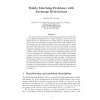Free Online Productivity Tools
i2Speak
i2Symbol
i2OCR
iTex2Img
iWeb2Print
iWeb2Shot
i2Type
iPdf2Split
iPdf2Merge
i2Bopomofo
i2Arabic
i2Style
i2Image
i2PDF
iLatex2Rtf
Sci2ools
137
Voted
JCO
2008
2008
Stable matching problems with exchange restrictions
We study variants of classical stable matching problems in which there is an additional requirement for a stable matching, namely that there should not be two participants who would prefer to exchange partners. The problem is motivated by the experience of real-world medical matching schemes that use stable matchings, where cases have arisen in which two participants discovered that each of them would prefer the other's allocation, a situation that is seen as unfair. Our main result is that the problem of deciding whether an instance of the classical stable marriage problem admits a stable matching, with the additional property that no two men would prefer to exchange partners, is NP-complete. This implies a similar result for more general problems, such as the hospitals/residents problem, the many-to-one extension of stable marriage. Unlike previous NP-hardness results for variants of stable marriage, the proof exploits the powerful algebraic structure underlying the set of all ...
Related Content
| Added | 13 Dec 2010 |
| Updated | 13 Dec 2010 |
| Type | Journal |
| Year | 2008 |
| Where | JCO |
| Authors | Robert W. Irving |
Comments (0)

